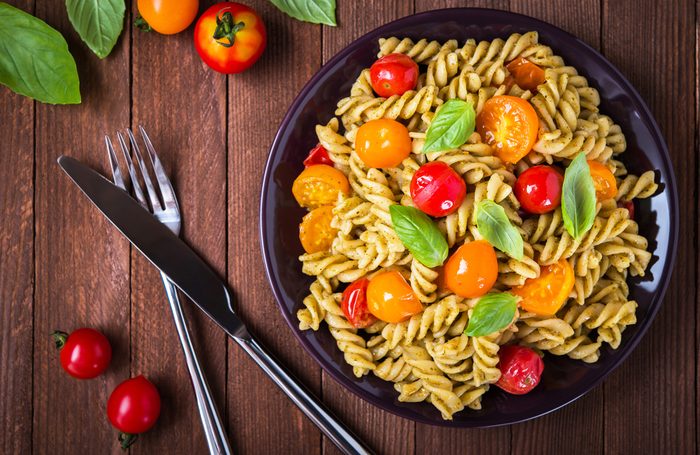Carbs 101
Carbs get a bad rap, to the point where people skip them altogether. That’s silly. Only some types of carbs are actually unhealthy. The good ones fuel your body, give you energy, and can help you lose and keep weight off. Not all carbs are created equal, though. So the first step is separating the bad from the good: Simple carbs such as those from refined flour and sugars—crackers, bread, sweets, and pasta—hike up your blood sugar levels and can increase inflammation while adding pounds. But complex carbohydrates—you get these in whole grains, veggies, fruits, and beans, for example—provide fiber and help promote a flat belly and optimal health.
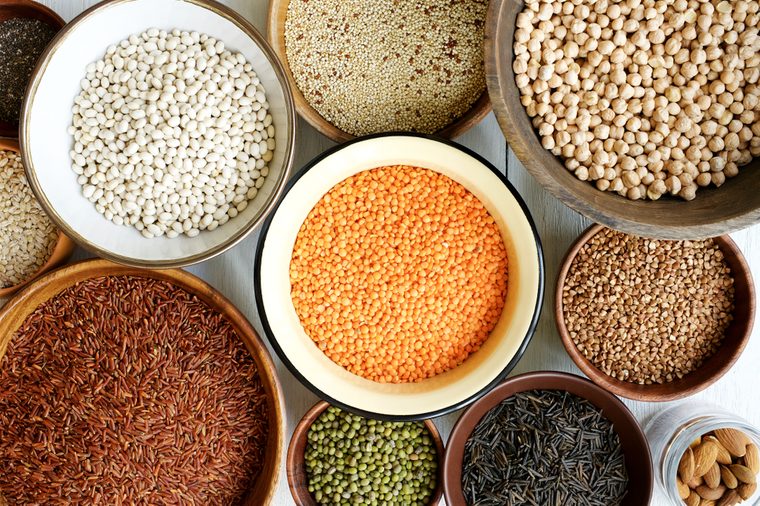
How many carbohydrates you need
Carbohydrates are the body’s main source of energy. If you eat about 2,000 calories a day, roughly 900 to 1,300 calories should be from carbohydrates (that translates to 225 to 325 grams of carbohydrates a day). If you don’t exercise much, you can eat fewer carbs, says Amy Goodson, RD. To get a sense of where you are, spend a day tracking your intake by checking the carbohydrate content of packaged foods on the nutrition facts label. The label shows total carbohydrates, which include starches, fiber, sugar alcohols, and naturally occurring and added sugars. The label might also separately list total fiber, soluble fiber, and sugar. Read on to see if you have any of the telltale signs that you aren’t getting enough carbs. (It’s true: the paleo diet may be wrong.)

Your breath stinks
When you consistently aren’t getting enough carbs, your body burns fat and protein for fuel and energy instead of carbs. It’s a process called ketosis. A potential side effect: really bad breath. That’s because the ketones being excreted in your saliva have an odor. “You want to bring your body out of ketosis to fix the bad breath,” says Amy Gorin, RDN, owner of Amy Gorin Nutrition in the New York City area. “Generally, consistently eating less than 50 grams of carbs a day will keep your body in ketosis. So amp up carb intake by eating more fruits, veggies, and whole grains.” You also want to drink lots of water. “It helps bad breath and aids in digestion,” says Phyl London, a Level IV master trainer specializing in Pilates and group exercise instruction who created Bodiphy, a program that combines Pilates, Barre, strength, and alignment training. London also suggests eating apples: “They have high levels of phenols which literally deodorize.” Here’s what you should know before starting the keto diet.
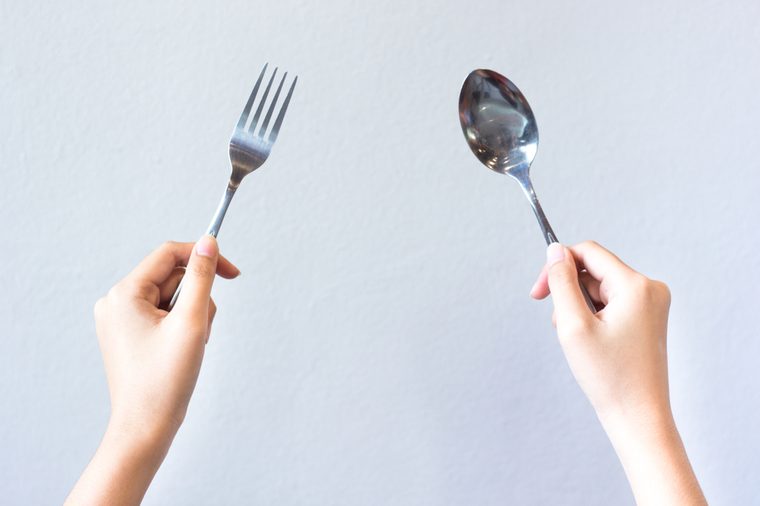
You’re moody
“Hangry”—hungry plus angry—is a real thing for low-carb dieters. Carbs play a role in the production of serotonin, a feel-good chemical that’s produced in the brain. Plus, without enough glucose, basic brain functions are impacted. That can lead to irritability and frustration. When you cut down on carb consumption, it can make you really crabby since you aren’t getting enough calories and your blood sugar is low. “Carbs are the king of comfort,” says Bonnie Taub-Dix, RDN, creator of BetterThanDieting.com and author of Read It Before You Eat It -Taking You from Label to Table. “They raise serotonin—the brain’s feel-good chemical—levels to calm you.” Plus, you can’t turn to comfort foods like mac and cheese when you’re in a bad mood. “This is especially true in the first weeks of a low-carbohydrate diet,” says Monica Auslander Moreno, RDN of Essence Nutrition. She suggests eating berries, which can also help combat headaches since they’re hydrating. This is one of the negative side effects of low-carb diets that they don’t tell you about.

You get headaches
Your brain needs carbs for maximum function. Your blood sugar drops when you cut carbs and, as a result, you frequently get headaches. An occasional headache is normal, but having them every day is a sign you may need some more carbs in your day. Gorin recommends eating a snack or meal every three to five hours. “This will help prevent blood sugar dipping and that ‘hangry’ feeling from coming on.” She recommends having sliced veggies and guacamole as a snack. Here are 30 guilt-free healthy snack ideas to curb your cravings.
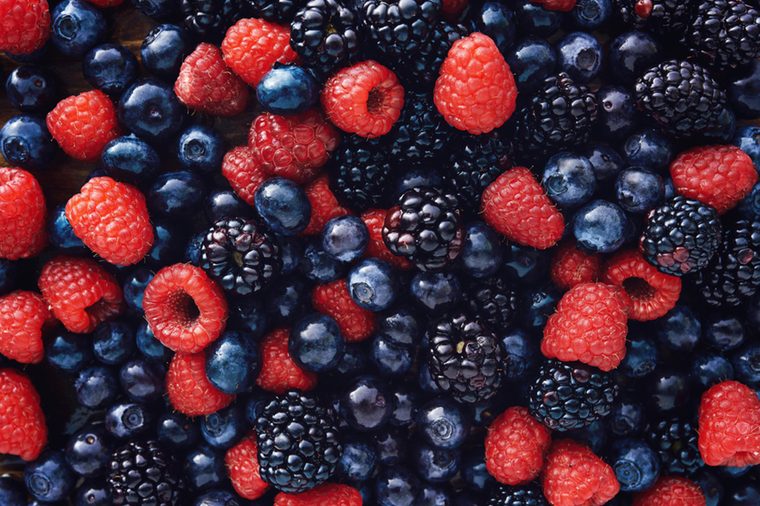
You feel bloated
If you’re skipping carbs, you can miss out on fiber, and that can lead to bloating. Be sure to drink plenty of water, which helps move waste through your bowels. Gorin recommends getting carbs from fruit (like bananas, berries, and cherries), starchy veggies (such as sweet potatoes) and whole grains (like brown rice, quinoa, and whole grain bread). “If you’re low on fiber, increase your intake slowly so you don’t suffer side effects like more bloating,” warns Gorin. Try these tips to get rid of your belly bloat.
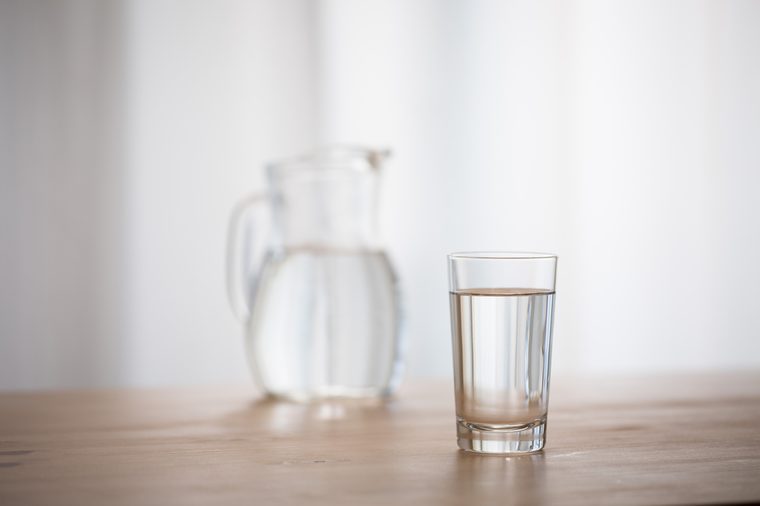
You’re constipated
This is another low-fiber issue from missing out on high-fiber carbs like whole grains and produce. In addition to adding back those healthy foods, drink more water and try these other home remedies. Altogether, this will make your stools softer and easier to move through the colon and to pass through you. London also suggests foods like chia, flax and pumpkin seeds, leafy greens, cauliflower, cabbage, and broccoli. Just be sure to be careful when adjusting your carbs. “You never want to increase or decrease the amount of fiber you eat too drastically,” says nutritionist Rania Batayneh, author of The One One One Diet: The Simple 1:1:1 Formula for Fast and Sustained Weight Loss. “If you’re looking to increase fiber intake, aim to increase your daily intake by five grams per week.”

You feel ill
Perhaps you’ve heard of the keto flu. It isn’t really the flu; it’s when you get flu-like symptoms if you’re starting a very low-carb diet such as the ketogenic diet. You may have nausea, dizziness, pain, inflammation, upset stomach, fatigue, and vomiting. You may feel like you can’t get out of bed or even get dressed. “Your body is switching from using carbs for fuel to using fat for fuel,” says nutritionist Alix Turoff, MS, RD. “You’re left feeling fluish because you’re fatigued and low on energy.” To help you feel better, drink electrolyte formulas or water. “Increase water and salt intakes,” says London. “You can also use bone broth and chicken and beef stock.” Are you a fat-burner or a sugar-burner?
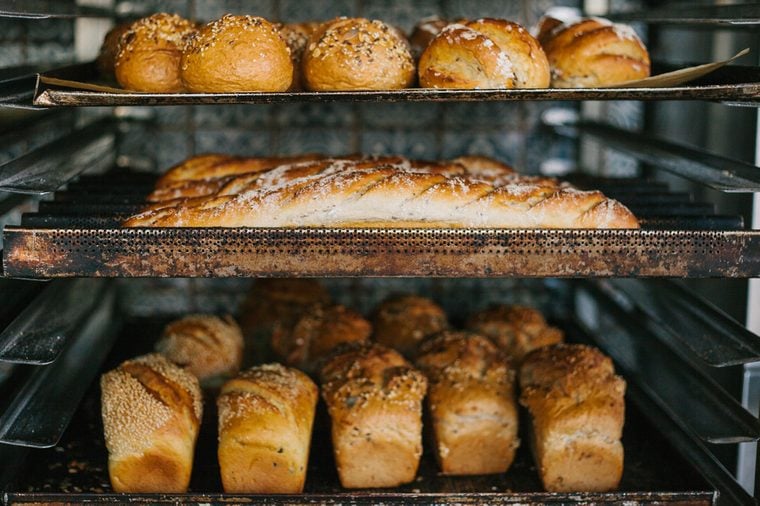
You dream of loaves of bread
If you fantasize about bagels, baguettes, and croissants all the time, it may be a sign that you need some carbs. “Diets that exclude whole food groups or severely limit them can turn those foods into ‘forbidden fruit’—avoided but strongly desired,” says Taub-Dix. “Avoidances like that don’t last. Instead, they become foods that become overconsumed beyond the amount needed for fuel.” That’s why it’s likely that when you do cave and snack on a carb, you’ll be inclined to go overboard. Once you tell yourself something is off limits, the more you want it. “Deprivation leads to indulgence,” says Auslander Moreno. “It’s much better to structure indulgences—what I call mindful indulgences—to placate and satisfy yourself, rather than set a hard ‘No never ever bagels’ and lose your mind about it and binge.”
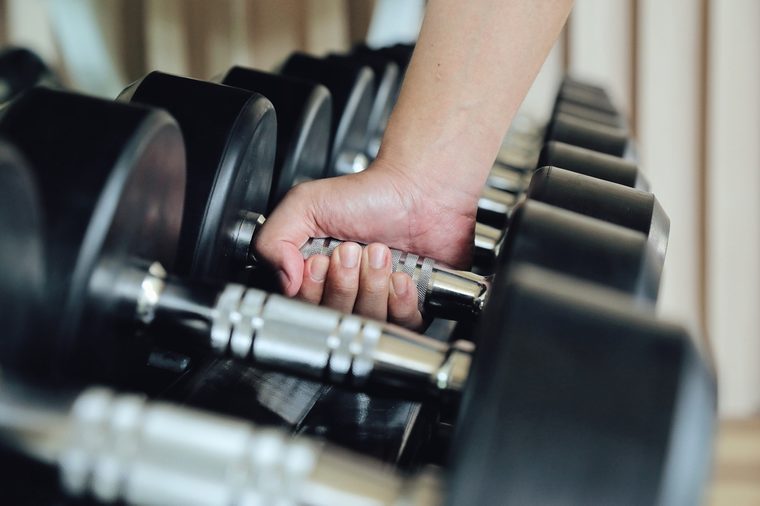
You have trouble getting through a workout
Exercises that you used to do easily may suddenly seem tough if you’ve cut carbs. When your muscles don’t have enough glucose, it can make you feel lethargic and have difficulty getting through a workout. To ensure you have enough energy to exercise, eat pre-workout snacks full of healthy carbs and protein. “The carbs help power your workout and the protein makes amino acids available to your body so that it doesn’t break down protein from your muscles,” Gorin says. “Aim for easier-to-digest carbs, so you may want to save your whole grains for later.” This is exactly what you should eat before a workout.

You’re feeling foggy
Your brain uses carbs for energy just like your body. You’ll feel and act a bit off kilter when your brain doesn’t get enough fuel. You may find that you’re having trouble staying on task and concentrating. Your brain needs adequate carbs to work optimally. “If you eat frequently—say every three hours—you won’t deprive your brain of energy,” says Auslander Moreno. “You don’t have to eat a whole bagel every three hours. But a handful of berries with walnuts, some carrots with baba ganoush, or some smoked salmon and flax crackers will suffice. You’ll feel much more balanced and alert.” Don’t miss these 7 medical reasons you’re always tired.
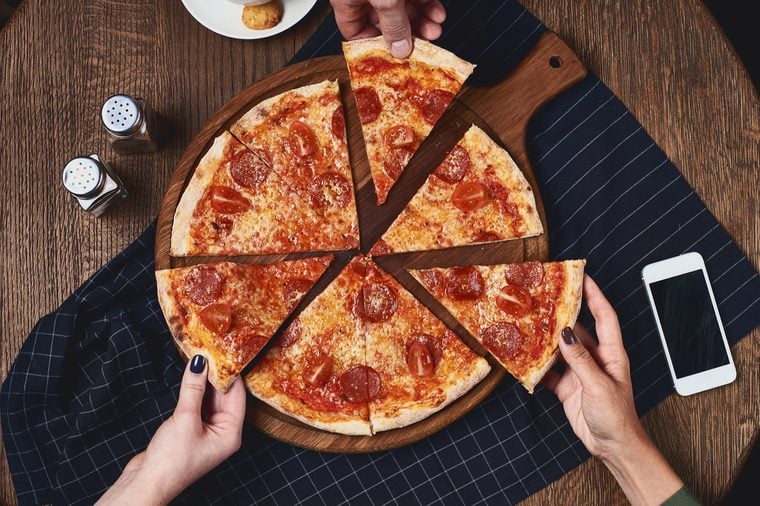
You’re always hungry
Most healthy carbs are full of belly-filling fiber. Women should aim for 25 grams of fiber per day and men should get around 38 grams. One study found that people who eat more fiber have reduced appetites and eat fewer calorie-dense foods, meaning they may consume fewer calories and may even see a slight weight loss. “Pair carbs with healthy fats or protein,” says Gorin. She suggests having a few tablespoons of pistachios, which offer healthy fats, plant protein, and fiber.

You feel like you’re losing muscle
When you do intense workouts without enough carbs in your diet, your body may convert muscle to help fuel your workouts. That’s why you may notice that you’re losing muscle mass. If your goal is weight loss, you won’t be happy. “Combining complex carbohydrates with complete protein sources may be your best bet,” says Auslander Moreno. She suggests eating an apple and almond butter post workout, or enjoy some sprouted bread toast with your omelet. “The right carbs can actually help you lose weight by keeping you away from less healthy, fatty foods that could be even more caloric,” says Taub-Dix. Here’s how to know if your tummy problems are actually IBS.

You’re always shivering
It’s 90 degrees out, but your teeth are chattering. Or the thermostat is on high, yet you grab a blanket. Low-carb dieters are at risk of developing low thyroid function. That can make it hard to regulate internal body temperature, and you may not be able to warm up just by putting on a sweater. Add more carbs and calories to your diet and the constant chill should go away. Batayneh suggests sipping on tea, coffee, or other warm beverages. “Or sip on broth or bouillon, which will also provide you with the extra electrolytes you need,” she says. If this symptom doesn’t improve, speak with your healthcare provider. Next, find out 13 silent signs you have a thyroid problem.
